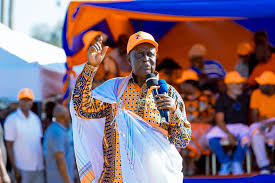
The Orange Democratic Movement (ODM) Constitution is being tested following last week’s decision by the National Governing Council (NGC) to approve recent changes to the party’s executive committee.
The party maintains that the NGC, an organ of the National Delegates Convention (NDC), is empowered to make interim changes to leadership structures, as the NDC convenes only once every five years.
The ODM Constitution outlines the composition, mandate and procedures of the National Executive Committee (NEC), including how vacancies may be filled on an interim basis.
Article 14 lists the National Officials of the Party, collectively forming the National Executive Committee (NEC). Article 15 governs the election of these officials.
Article 16 outlines the office of the Party Leader, including its functions and the process of assumption of office through election by the National Delegates Convention (NDC).
Article 51 establishes the NEC and details its roles and responsibilities.
Role of the National Governing Council
Article 50 sets out the functions of the NGC. Under Article 50(2)(b), it serves as the broader executive arm of the NDC.
Article 50(2)(c) mandates the NGC to receive, review and approve reports from the NEC on the party’s operations, acting on behalf of the NDC under Article 50(2)(d).
Additionally, Article 50(2)(j) allows the NGC to ratify NEC decisions when, in the NEC’s view, such matters cannot wait until the next NDC meeting.
Filling a Vacancy in the NEC
Article 73 outlines procedures for filling vacancies in elective party positions before new elections, as required under Article 15.
Article 73(2) authorises the NEC to appoint a party member on an interim basis to fill a vacant position, to serve for the remainder of the term or until elections are held.
According to the party, this framework ensures continuity and stability when vacancies arise.
“The changes confirmed by the NGC in Mombasa last week are procedural and adhere to the party Constitution,” said lawyer Fred Orego, who chaired the ODM 2024 Constitution Review Committee.
East African Legislative Assembly (EALA) Member Winnie Odinga recently stated that only the NDC, as the party’s supreme organ, can elect national officials or appoint NEC members.
“In matters concerning the broad-based government, ODM placed its trust in one individual, Raila Amolo Odinga. That relationship is complex. So now, as others step forward to manage it, we must ask: are they equipped for the task? This isn’t for me to decide, but for ODM members. That’s why I’m calling for an NDC,” she said.
Sabaot MP Caleb Amisi, who also sits in the NEC, similarly argued that the appointment should be subject to election by the NDC.
He said members are free to challenge the decision through internal party mechanisms or in court, noting that the Constitution provides guidance on how the party leader is to be elected.
ODM National Chairperson Gladys Wanga, whose confirmation was also among those approved by the NGC, alongside Simba Arati, Abdulswamad Sharrif Nassir and Godfrey Osotsi as Deputy Party Leaders, defended the resolutions.
“The NGC is the executive arm of the NDC. Convening an NDC is a major exercise. Now that the NGC has ratified these officers, we are formally in office,” she said.
Also confirmed were Vice Chairpersons Ariko Namoit and Otiende Amollo. Kisumu Woman Representative Ruth Odinga and Kisumu West MP Rosa Buyu were confirmed as Deputy Organising Secretary and Secretary of Political Affairs, respectively.
Under the Political Parties Act, ODM is required to file returns reflecting the leadership changes with the Office of the Registrar of Political Parties (ORPP). The Registrar will gazette the officials once satisfied that legal requirements have been met.
Party members with objections may petition the Registrar in line with the dispute-resolution mechanisms provided under the law.
Political parties in Kenya operate under a legal framework that includes Article 38 of the Constitution, the Political Parties Act, the Elections Act and the IEBC Act, alongside their internal constitutions.
The ORPP is mandated to oversee registration, regulation, funding and governance of political parties, ensuring compliance with democratic principles and national outlook requirements.

















